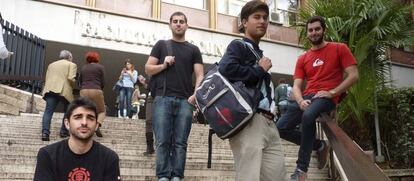Spain slashes Erasmus budget by more than 50% in six years
The €61.3 million spent by the state on the EU’s most famous grant program was cut due to the crisis
The Erasmus student exchange program has just turned 30. Spain, which started the program with just 95 students, now sends around 40,000 Spanish students to study abroad every year. The number is holding steady despite cuts to the most famous of the European Union’s (EU) grant programs. The €61.3 million that it counted on in 2011 has now been cut to €29 million this year, although the figure was even lower during the worst years of the crisis. The amount spent on Erasmus by Brussels, meanwhile, has risen over the last six years.

Spain continues to be the most popular destination for Erasmus students. And the University of Granada is the most in-demand institution in all of Europe. Representatives from the Education Ministry were present on May 16 at an event in Barcelona to celebrate the 30th anniversary of one of the programs that has done most for the unity of the continent, and to celebrate some of the figures and achievements to stem from Erasmus.
Spain spent €61.3 million on the Erasmus program in 2011 but just €29 million this year
As the ministry pointed out, at least 20% of higher education graduates have been sent out of Spain to study thanks to these grants. “The success of the Erasmus program in Spain is undeniable, not just among the university community, but also in society as a whole,” said the Spanish general secretary for universities, Jorge Sáinz.
But despite the recognized effects of this European plan in terms of improving the skills and horizons of students, the economic crisis has had a serious effect on the budget. In the last five years, Spain has cut spending from €61.3 million to €29 million.
Spanish Erasmus students receive a sum of between €200 and €400 a month
This information came to light in response to a question tabled by deputy in Congress Miguel Ángel Heredia (PSOE), who requested information about the number of university students who applied for the grants in 2015, and how many had done so since 2011 – the last year of the Socialist government – broken down by year, province and autonomous region.
“The exchange of students is one of the greatest investments by the EU, and makes Europe stronger,” said Heredia. “The money from Spain steadily increased until the arrival of [Popular Party Prime Minister] Mariano Rajoy, who has made tremendous cuts.”
The figures reveal that the more than €60 million spent in 2011 fell to €16.3 million in the 2014-2015 academic year. Last year saw the figure rise to €23.5 million, while this year it is up to €29 million.
Why is there no political will to show the improvement in the economy with investment in grants? Miguel Ángel Heredia, Socialist deputy
Brussels, meanwhile, has increased its share by €10 million since 2011, a 27% rise, according to the figures supplied by the Spanish state body in charge of administering these funds, the SEPIE. Its director, Pablo Martín, explains that until 2013 the Spanish subsidy was complementary – i.e. granted in addition to the funds that came from the European Union. “It was allotted according to the students’ destination, and extra funds were added from Spain,” he explains. But from 2014 onward, the year that the Spanish budget for Erasmus fell to its lowest level, Spain decided to award its own grants, which were separate from those handed out by the EU. That year a total of 36,842 Spanish students went to study abroad, the lowest figure in the last five years.
Spanish Erasmus students receive between €200 and €400 a month, according to the SEPIE. Heredia is calling for that “tiny” amount to be increased above all in the case of families “with scant resources.” Why isn’t there any political will to show the improvement in the economy with investment in the policy of grants?” the deputy asks. The ministry is planning an allocation of €29 million once again in the coming academic year.
English version by Simon Hunter.
Tu suscripción se está usando en otro dispositivo
¿Quieres añadir otro usuario a tu suscripción?
Si continúas leyendo en este dispositivo, no se podrá leer en el otro.
FlechaTu suscripción se está usando en otro dispositivo y solo puedes acceder a EL PAÍS desde un dispositivo a la vez.
Si quieres compartir tu cuenta, cambia tu suscripción a la modalidad Premium, así podrás añadir otro usuario. Cada uno accederá con su propia cuenta de email, lo que os permitirá personalizar vuestra experiencia en EL PAÍS.
¿Tienes una suscripción de empresa? Accede aquí para contratar más cuentas.
En el caso de no saber quién está usando tu cuenta, te recomendamos cambiar tu contraseña aquí.
Si decides continuar compartiendo tu cuenta, este mensaje se mostrará en tu dispositivo y en el de la otra persona que está usando tu cuenta de forma indefinida, afectando a tu experiencia de lectura. Puedes consultar aquí los términos y condiciones de la suscripción digital.








































